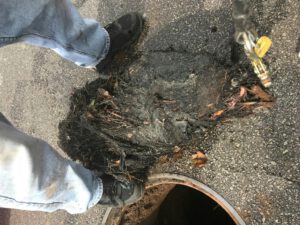Sandy Springs Plumbers are a valuable part of society. They ensure clean water, efficient drainage systems, and healthy living conditions.
Plumbers often work in factories, commercial buildings, and homes. They are responsible for reading blueprints and interpreting building codes to install or repair plumbing systems. They may also collaborate with electricians to properly integrate the plumbing and electrical systems.

A plumbing system is a crucial part of any home or business. It removes wastewater, provides hot and cold water, and regulates indoor climate. Plumbers are skilled tradespeople who install, repair, and maintain these systems. They may work for large plumbing companies or independently as contractors. They can also specialize in residential or commercial work. Plumbers need to be knowledgeable about various plumbing topics, including pipe systems, water heaters, and drains. They must also have strong customer service skills to communicate with clients and answer questions about their plumbing systems.
A high school diploma is typically required for becoming a plumber. Those who want to start this career path can find an apprenticeship program that provides on-the-job training. Alternatively, they can attend technical schools and take pipe system design, welding, safety, and tools courses. Plumbers must also obtain a license before they can begin working. They can earn this license by passing a test and meeting other requirements set by their state or jurisdiction.
While a high school diploma is necessary to become a plumber, more is needed to succeed. In addition to having a solid understanding of the plumbing industry, plumbers must be detail-oriented and be able to work well under pressure. They should also be able to work with a wide range of materials, including copper, steel, and plastic.
Plumbers are responsible for installing the pipes that carry water, chemicals, and waste. They also repair and inspect these systems. They must be able to determine what material is needed, measure the lengths of pipes, and cut them to size using hand or power tools. They must also be able to solder and weld the pipe joints together. Plumbers must also know how to read blueprints and understand building regulations.
Because plumbers are often working with dangerous or toxic materials, they must wear protective equipment. They should wear gloves when handling chemicals and use eye protection when using soldering tools. They also need to be comfortable working with their hands in confined spaces, such as under sinks and behind toilets. Several types of heavy-duty gloves on the market can protect plumbers’ hands and allow them to grip slippery objects more easily.
Plumbers must have a high school diploma or equivalent and complete on-the-job training. Taking math, science, and especially physics and chemistry courses can help a prospective plumber understand how water and other materials work. Taking shop or technical education courses is also advisable, as they can provide valuable hands-on experience and familiarity with tools and systems. Additionally, blueprint reading courses can help understand the plumbing plans and symbols used in construction.
Those interested in becoming plumbers can attend formal apprenticeship programs, usually lasting 4-6 years. These programs combine classroom studies with on-the-job training under the supervision of a certified journeyperson. Apprentices earn while they learn, starting at about 50 percent of the journeyperson’s hourly wage. In addition to apprenticeship, many plumbers complete post-secondary coursework and technical school courses in pipe system design, welding, and safety procedures.
In addition to technical knowledge, plumbers must have excellent attention to detail and physical stamina. They also need to be good communicators and able to explain complex plumbing issues in layperson’s terms. Because they work with various materials and tools, they must be aware of the safety issues involved in each project. Finally, plumbers should be knowledgeable about local building codes and regulations.
The qualifications for a plumber vary from jurisdiction to jurisdiction. Applicants must have a high school diploma or equivalent and several years of on-the-job experience as an apprentice. In addition, they must pass a technical exam and a business and law exam.
Other professional certifications are not required but may make the job more attractive to employers and customers. For instance, the National Inspection Testing and Certification (NITC) offers a program that qualifies candidates to become master plumbers. The program also provides continuing education courses to help qualified candidates maintain their licenses.
To become a licensed plumber, you must have at least five years of on-the-job experience as a licensed journey plumber. In addition, you must have completed a formal apprenticeship and passed the corresponding exam.
Plumbing is a highly demanding profession that requires hard work and stamina. Plumbers often work odd hours and are on call to respond to emergencies. They also need to be comfortable working with tools and navigating tight spaces. Plumbers may be exposed to toxic materials and need to wear protective equipment.
Plumbers can work in both residential and commercial environments. They install and repair pipes transporting water, chemicals, waste, and gases. They use saws and other power tools to cut holes in walls and floors, then measure and fit pipe sections together. They also troubleshoot dysfunctional systems and do repairs. Plumbers can work for companies that specialize in residential or commercial projects, or they can work independently.
In new construction projects, plumbers are involved from the outset, working from blueprints and architectural plans to design and install the necessary plumbing infrastructure. This includes laying pipes, setting toilets, and installing faucets and appliances. Plumbers in existing homes and businesses fix leaky faucets, clogged drains, and water heaters. They may also be called on to advise customers on ways to conserve water and improve the efficiency of their plumbing systems.
In addition to performing traditional plumbing duties, plumbers may also be responsible for inspecting and testing pressure levels in pipes, identifying potential problem areas, and locating and repairing blockages. They also need to thoroughly understand building codes and regulations to ensure their work is up to code. Plumbers also risk exposure to human waste, which can contain dangerous microbes such as cholera, typhoid, and hepatitis. Plumbers must wear protective gloves and eyewear when handling such materials.
Plumbers install, repair, and maintain pipes, fixtures, appliances, and wastewater systems. They work in residential, commercial, and industrial environments. Depending on the type of project, duties may include:
- Inspecting existing systems.
- Testing pressure levels.
- Locating leaks.
- Clearing blocked drains and repairing faulty faucets and toilets.
They are employed by plumbing contractors, construction companies, and maintenance departments, or they may be self-employed.
The demand for skilled plumbers is high. But with such a shortage of professionals, finding the right candidate for the job can take time and effort. To make sure you get the best candidates, it’s important to understand what makes a good plumber. A well-trained and experienced plumber can diagnose the problem quickly and provide a quick and effective solution.
In addition to being a skilled technician, plumbers must also have a strong understanding of building regulations and safety protocols. This is crucial for ensuring all plumbing installations and repairs are done correctly. It is also important for plumbers to work effectively under pressure, as they are often required to complete urgent repairs within tight timeframes.
As a result, plumbing businesses need to attract and retain the most qualified plumbers by offering competitive salaries. However, the salary of a plumber can vary widely, especially in different regions of the country. To help you decide what salary to offer, this comprehensive plumber salary guide provides useful information, including national averages, regional variations, and state-by-state breakdowns.
It also includes figures for the 10th, 50th, and 90th percentiles, making it easy to compare the pay of plumbers across the country. These statistics can be helpful for both job seekers and employers as they look to attract and retain the best plumbers.
You can increase your plumber salary in several ways, including earning industry-related certifications and completing additional training. In addition, you can invest in the tools and technology that will enable you to perform your plumbing jobs more efficiently and accurately. These tools can help you save time by reducing administrative tasks and improving your bottom line.





